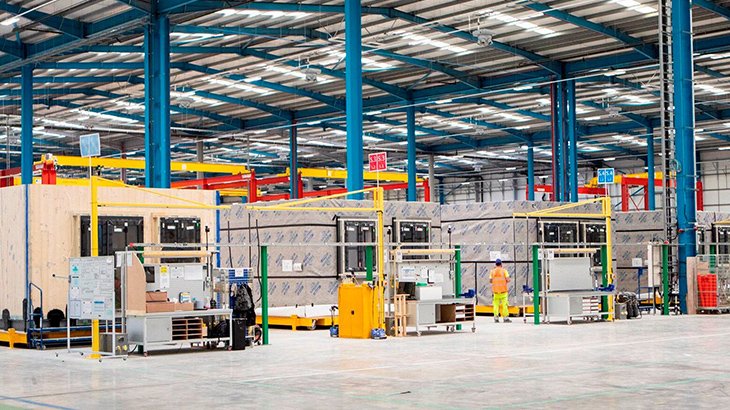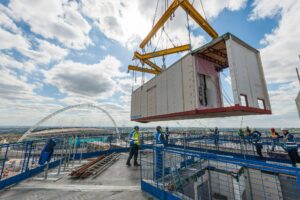By Gary Fleisher
Purchasing an operating modular home factory can present an enticing investment opportunity. However, ensuring a successful venture necessitates a rigorous evaluation of various facets of the facility. In this comprehensive guide, I will navigate you through the crucial steps of conducting due diligence to empower you to make an informed decision.

Collaborating with professionals such as financial advisors, legal experts, environmental specialists, and industry insiders can be instrumental in effectively navigating the intricate process and customizing it to your unique requirements and objectives.
Financial Due Diligence
When it comes to financial due diligence in the modular construction industry, a comprehensive examination of the factory’s financial health is paramount. Key areas to concentrate on include:
- Review Financial Statements: Delve into income statements, balance sheets, and cash flow statements spanning the past 3-5 years to gain insights into the factory’s financial stability and growth trajectory.
- Analyze Revenue Trends: Scrutinize revenue trends, profitability, and cost structures to ensure that the factory’s financial performance aligns with your expectations.
- Evaluate Working Capital: Investigate the factory’s working capital and cash reserves to gauge its capacity to meet operational needs and invest in expansion.
- Debts and Liabilities: Thoroughly inspect any outstanding debts, loans, or liabilities to grasp potential financial burdens.
- Tax Records: Scrutinize tax records and compliance history to ascertain that no unresolved tax issues are lurking.
- Financial Projections: Scrutinize the factory’s financial projections and budget to evaluate future growth potential and inherent risks.
Operational Due Diligence
Operational due diligence entails a meticulous examination of the day-to-day operations within the modular construction factory. Key considerations encompass:
- Production Processes: Analyze the factory’s production processes, equipment, and machinery to ensure that they are efficient and well-maintained.
- Asset Condition: Evaluate the condition of assets and assess whether any maintenance or upgrades are necessary.
- Production Metrics: Analyze production schedules, efficiency metrics, and historical performance data to pinpoint areas for enhancement.
- Inventory Management: Assess inventory levels and management practices to optimize working capital and minimize holding costs.
- Supplier and Customer Relationships: Examine the strength of supplier and customer relationships to gauge the resilience of the supply chain.
- Labor Issues: Investigate any labor-related concerns, including employment contracts, union affiliations, and workforce stability.

Legal Due Diligence
Legal due diligence is pivotal to identifying potential legal risks and liabilities associated with the factory in the modular construction industry. Crucial areas to explore include:
- Contract Review: Scrutinize all contracts, including supplier agreements, customer contracts, and leases, to grasp obligations and potential risks.
- Permits and Licenses: Confirm the existence and currency of all necessary permits, licenses, and certifications to avoid regulatory complications.
- Litigation and Disputes: Investigate ongoing or potential litigation or disputes that could adversely affect the factory’s operations or finances.
- Intellectual Property: Review intellectual property rights, trademarks, and patents to safeguard proprietary technology or products.
- Environmental Compliance: Examine the factory’s compliance with environmental regulations and evaluate any related liabilities that may necessitate mitigation measures.
Environmental Due Diligence
Environmental due diligence assures compliance with environmental regulations and identifies potential contamination risks. Essential steps involve:
- Environmental Site Assessment: Conduct a thorough environmental site assessment, encompassing Phase I and potentially Phase II assessments, to pinpoint contamination risks.
- Regulatory Compliance: Investigate adherence to environmental regulations and permits to steer clear of potential legal and financial repercussions.
- Liabilities and Mitigation: Assess potential environmental liabilities and formulate strategies to address them effectively.
Regulatory and Compliance Due Diligence
It’s imperative to ensure that the factory adheres to industry-specific regulations, safety standards, and health and safety protocols within the modular construction industry. Key aspects to scrutinize encompass:
- Industry Regulations: Verify compliance with industry-specific regulations and standards to evade potential penalties or operational disruptions.
- Safety Records: Review safety records to ascertain that there are no safety violations or workplace incidents jeopardizing employee well-being or factory operations.
Market and Competitive Analysis
Understanding market dynamics and the competitive landscape surrounding the factory is pivotal:
- Market Position: Analyze the factory’s position within the modular construction market, including market share and growth potential.
- Competitive Landscape: Evaluate the competitive landscape and potential competitive threats or market fluctuations.
- Industry Trends: Investigate industry trends and prospects to assess the factory’s long-term viability within the modular construction sector.
Human Resources Due Diligence
Conduct a comprehensive review of human resources aspects:
- Employee Records: Examine employee records, encompassing contracts, compensation packages, and benefits, to comprehend workforce-related costs.
- Workforce Morale: Assess employee morale, turnover rates, and training programs to gauge the overall health of the workforce.
- Labor Issues: Determine if there are any unresolved human resources issues or potential labor disputes that could disrupt factory operations.
Real Estate and Location
Evaluate the physical condition of the factory’s buildings and infrastructure. Additionally, consider whether the factory’s location aligns with your modular construction business needs.
Insurance Coverage
Review existing insurance policies, encompassing property, liability, and workers’ compensation coverage, to ascertain that they sufficiently mitigate potential risks within the modular construction industry.

Photo – Brave Control Solutions
Technology and IT Infrastructure
Evaluate the factory’s IT systems, data security measures, and cybersecurity protocols within the context of modular construction. Furthermore, check for software licenses and maintenance contracts to ensure seamless operations.
Intellectual Property
Confirm ownership and protection of any proprietary technology, processes, or products to safeguard your intellectual property rights within the modular construction sector.
Management Team
Assess the capabilities and experience of the current management team to ensure that they possess the expertise required to effectively lead the factory in the modular construction industry.
Exit Strategy
Lastly, contemplate your exit strategies and the potential resale value of the factory to establish a forward-looking plan within the modular construction sector.
Due Diligence Duration Period
The duration of due diligence before buying an operating modular factory can vary significantly based on several factors, including the complexity of the factory, the extent of the due diligence required, the responsiveness of the parties involved, and your specific goals and requirements.
Generally, due diligence for a factory acquisition can take anywhere from a few weeks to several months. Here are some factors that can influence the timeline:
- Scope of Due Diligence: The more comprehensive your due diligence, the longer it will take. If you need to investigate multiple aspects, such as financials, operations, legal, environmental, and more, it will naturally take more time.
- Size and Complexity of the Factory: Larger and more complex factories may require additional time for thorough evaluations. Smaller facilities with simpler operations might have a shorter due diligence timeline.
- Regulatory and Compliance Issues: If the factory is subject to extensive regulatory requirements or has compliance issues, it may take longer to address these concerns.
- Data Availability: The time it takes to gather and review necessary documents and information can significantly impact the due diligence timeline. Delays in obtaining information from the seller or third parties can extend the process.
- Negotiations and Deal Structure: The time spent negotiating the terms of the deal can also affect the due diligence timeline. Complex negotiations may require additional time.
- Legal and Environmental Issues: Discovering legal or environmental issues during due diligence can lead to further investigations and potential delays if remediation or additional assessments are needed.
- Financial and Tax Considerations: Complex financial structures or tax-related matters may require additional time for review and analysis.
- Third-Party Experts: If you engage external experts, such as financial advisors, legal counsel, or environmental consultants, their availability and the time needed for their assessments can impact the timeline.
It’s essential to strike a balance between conducting thorough due diligence and completing the process within a reasonable timeframe. A realistic due diligence timeline should be established early in the process and can vary depending on the specific circumstances of the factory acquisition. You should also consider any contractual deadlines or requirements stipulated in the purchase agreement. Communication and coordination with all parties involved are key to managing expectations and ensuring a smooth due diligence process.
A buyer may asked to pay a due diligence fee to a seller for a negotiated period of due diligence. The due diligence fee is non-refundable and is paid directly to the seller.

Conducting due diligence when acquiring an operating modular home factory is a multifaceted process demanding meticulous attention to detail. Collaborating with experts possessing comprehensive knowledge of the modular construction sector can significantly enhance your ability to navigate this process successfully and make an informed investment decision tailored to your modular construction objectives.
.
CLICK HERE TO READ DECEMBER’S ISSUE
Gary Fleisher, the Modcoach, author























